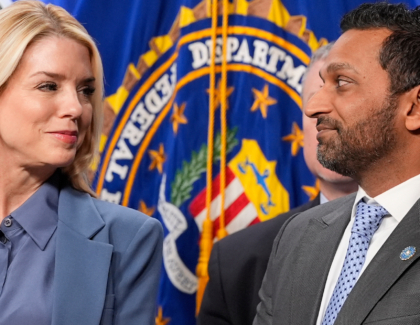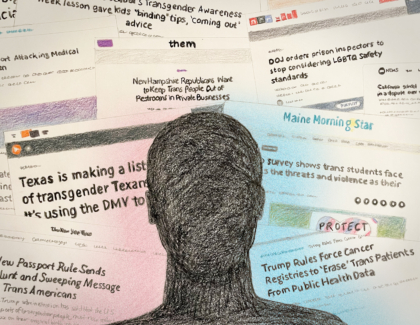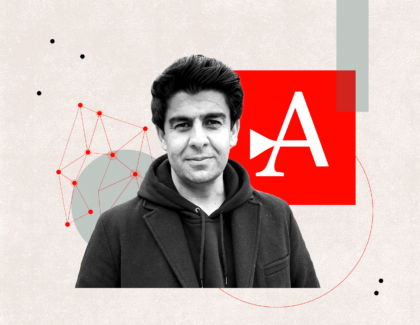Sign up for the daily CJR newsletter.
As Donald Trump has amped up his attacks on the press, fears have grown about the collateral effects on journalism—from an assault on libel laws and open records, to a tougher environment for Freedom of Information Act requests.
Jameel Jaffer, director of the Knight First Amendment Institute at Columbia University, has been on the front lines of open-records battles for more than a decade, including as the deputy legal director of the ACLU overseeing the organization’s work related to national security. Jaffer led the ACLU’s legal battle to secure the release of classified government documents related to drone attacks, leading last year to the publication of The Drone Memos: Targeted Killing, Secrecy and the Law.
In this conversation, Jaffer discusses government transparency under Presidents Bush, Obama, and Trump with Karen Greenberg, director of the Center on National Security at Fordham University, and David McCraw, legal counsel for The New York Times, which litigated alongside the ACLU for disclosure of the drone memos.
The conversation has been edited for space and clarity.
Greenberg: Maybe we should just begin with your sense of the pendulum swing. How far toward some kind of transparency do you think the country moved under the Obama administration?
Jaffer: I was very frustrated with the level of transparency that the Obama administration was willing to grant us. We had to fight for every incremental piece of information. The first lawsuits we filed under the Freedom of Information Act were greeted with the response that any acknowledgement of the CIA’s role in targeted killing would jeopardize national security, so there was no possibility, the CIA said, of processing Freedom of Information Act requests in the normal course. Over a period of five or six years, we managed to chip away gradually at that wall, eventually getting courts to order the government to disclose some documents related to the program, but those victories were hard fought.
At the end of the day, what did we get? I think from one perspective, you could see these cases as significant victories. I think from the view of a litigator, they look like victories: You have appeals courts ruling that the government’s secrecy arguments were unjustified, and ordering the government to disclose information that in the government’s view was probably classified, which is in fact remarkable and truly extraordinary thing. But if you take a broader view, we got an acknowledgement of things that everybody already knew. By the time those memos came out, most of the substance of the memos had been leaked in one way or another.
Greenberg: David, you have a larger perspective on just how frustrating it’s been to be in the journalism business when there’s so little access to anything except what the government wants us to hear. Have we made progress?
McCraw: I think we should have expected, could have expected, and still expect the courts to do better. That FOIA was always in the hands of bureaucracies, that was the entire plan, and it was always going to involve citizens making a request rather than some sort of proactive disclosure by the agency. The court becomes crucial because you have this imbalance of power; the individual requester versus the power of the federal government, the agency of the federal government. And, more than that, you really need a court to referee, because the FOIA officers are never going to feel empowered to stand up to the agency and make a disclosure. Disclosure is always going to be the riskier choice. These classification decisions are, in large part, subjective. There may be actual things that have to be secret, but we see that the agencies themselves are disagreeing about it. That’s frustrating to see courts not willing to realize that and say, “I as a federal judge have the right to question that decision.”
I think the second thing that’s frustrating is that despite our divided times, FOIA remains something that is supported in a bipartisan way. All of the FOIA amendments have garnered enormous support from Republicans and Democrats—Democrats, I think, because of a tradition for openness; Republicans because they think the government’s up to something. Whether that will stay, I don’t know, but we’ve seen it in administration after administration. We’ve seen it since the passage of FOIA in the 60s, the amendments in the 70s, the improvements in 2007, the recent improvements in the past year. I don’t know why the courts are not on that same program. Congress wants there to be a powerful FOIA statute and the courts have disappointed.
Jaffer: I wonder whether, at the margins now, we’re seeing the courts a little more skeptical of national security claims than they were, certainly, 4, 6, 8, 14 years ago. And I wonder whether the courts will continue to go in that direction with a new administration, which perhaps they might trust a little bit less than they trusted the Obama administration. A lot of Americans were willing to invest very broad power in the presidency because they trusted the president. They may look very differently at those powers when they’re exercised by President Trump, especially if he exercises them more aggressively.
I wonder if the courts, too, will look at those powers differently, whether they will be more skeptical when the government says, “we’re holding this person on national security grounds, we can’t tell you why,” or, “this person was a lawful target, we can’t tell you why,” or “this surveillance is effective but we can’t explain how it works.” Those claims, which the courts have, I think, very troublingly accepted over and over again, first under President Bush and then more recently under President Obama, maybe those claims aren’t as persuasive when they’re made by the next administration. Or maybe that’s just wishful thinking.
I guess I should also say that I wonder whether there’s something too simplistic about the way we sometimes think about secrecy in this context. The government keeps crucial information secret from us, but it’s also true that in some situations the secrecy can become a tool that we rely on to disclaim moral responsibility for the government’s policies. I worry a little bit that’s what happened with the drone campaign—that yes, the government kept us from knowing the full import of its policies, but in doing that it also spared us from the responsibility, the moral burden of those policies. That means that the policies—that the perpetuation of the policies depends on secrecy in a slightly different way than we usually acknowledge. Maybe if we had known in 2002 what the CIA and what the defense department were doing, the interrogation policies would have changed. Maybe there would have been enough of a public outcry that the government would have been forced to change its policies much earlier than it did. But maybe we didn’t ask as many questions as we should have because we were happy to be spared the responsibility that would have come with knowledge.
RELATED: One question that turns courageous journalists into cowards
McCraw: I would draw the distinction here between drones and torture on one hand—which I think are topics that the public immediately can grasp and make a decision about—and the national security apparatus and the legal overlay to it. It’s become so complicated it’s very difficult to get public consensus around these things except for the headline issues.
Greenberg: That seems right, and it’s also that people don’t believe anyone anymore. They don’t know who to believe. No offense to the media, but when you start to explain the surveillance issue, I can see it on people’s faces, they just kind of roll their eyes and go, Oh, well, that’s your take on it. There’s no reliable narrative out there that you can point to.
Perhaps greater access to government documents—through a broadened use of FOIA—would, by promoting transparency, further the public’s trust in government and the narrative it presents, especially when it comes to highly sensitive issues such as those involved in national security matters.
Jaffer: Well, I do think there are changes that Congress could, in theory, make to the Freedom of Information Act that would help. One is a public interest override. So there are circumstances in which the government has a legitimate interest in keeping something secret, but the public interest in disclosure is greater than the sort of narrowly construed government interest in keeping the thing secret. There’s no mechanism under the FOIA for forcing disclosure in those circumstances. Many other countries that have analogous statutes to the FOIA have public interest overrides and it seems to me that that would be one important change.
Another one would be to clarify the meaning of the phrase “working law,” which, under the FOIA, the government is supposed to make public. The law that is the basis for the government’s actions is supposed to be public under the FOIA, but because of a series of recent decisions the government now has broader power to withhold its working law. I think that a basic proposition in any democracy is that the law should be public. In many contexts involving national security, though, the law that matters is the law that’s written inside the executive branch, and this law is routinely kept secret. Congress could reaffirm the government’s obligation to disclose that law, and it should.
Greenberg: Do you think that if there had been some kind of accountability, we would feel differently about this? We’d say OK, we have accountability, we don’t need to know that much because the point has been made?
McCraw: This issue of course came up when the Times published the names of three CIA officials. There was a huge pushback about naming them even though they had been involved in both the targeted killing program and in the interrogation of people after 9/11. Knowing who people are creates a sort of accountability because they know that some day they may have to answer for it—the decision they’re making today. When there’s secrecy, you can feel that you’re in that bubble, and that even if this goes badly, or we shouldn’t be doing it, that no one is ever going to pin it on you and ultimately, accountability is about individuals rather than institutions.
Jaffer: I think that’s right. Often, responsibility for these kinds of decisions is dispersed—sometimes by design and sometimes just because bureaucracies disperse responsibility. But if you are a national security official who’s asked to participate in some way in a program like this, you might now ask: Am I the one who’s responsible for this? Who is actually responsible for this?
McCraw: Because you’re worried.
Jaffer: Whose name is going to be in the paper? And I think that’s an important thing.
McCraw: Related somewhat is the fact that when we do these FOIA cases, which go on and on, and have incremental gains and so forth, we start to understand how endemic secrecy is. You get redacted documents where someone has actually spent time thinking about it.
Jaffer: In the FOIA litigation, there would be these occasions in which the government would be defending the withholding of a document. Its defense would be heavily redacted, and then because the defense was heavily redacted, the court would have to meet in secret, and after the court had met in secret, it would release a transcript of the ex parte hearing and the transcript would be heavily redacted! I mean, it just metastasizes. Once you accept that a particular thing is secret, it’s very hard to control. It just gets out of control very quickly.
McCraw: Right. Secrecy becomes the default. And pretty soon, the judges, the government attorneys, those people who could have spoken up, are all part of this system where secrecy is the default.
Greenberg: So maybe we need a complete rethinking, given the fact that we are now locked into a war against terrorism forever. A complete rethinking of how you justify secrecy in terms of national security because we all agree there should be some secrets. Is that right? The government has to have some secret?
Jaffer: We all agree
Greenberg: But maybe there needs to be some rethinking. You have people in government who would rather be safe than sorry. They don’t want to be chastised for releasing something, and so the default becomes classifying materials broadly and loosely, and as it stands now, nobody seems to want to call them to account for it.
Jaffer: This is a question that I think is beyond the reach of the law—why judges, after having been told over and over again by Congress that we want you to scrutinize the government’s national security claims, why judges so rarely actually do that. It’s hard to understand why they think their hands are tied. You know, Congress has given them a directive over and over again. And yet.
Greenberg: Maybe they are just scared. People are scared. Does anyone get that feeling? They’re more scared of bad things happening, like a terrorist attack, than they are of the government. Nobody wants blood on their hands. In terrorism trials, it’s the same. Judges say, “I’m sorry, but, my hands are tied.” I mean, really? They’re federal judges. And so, I just think that we underestimate how much of this is not just deference to the powers that be, but reflects fundamental fear.
RELATED: Print is dead. Long live print.
Has America ever needed a media defender more than now? Help us by joining CJR today.







